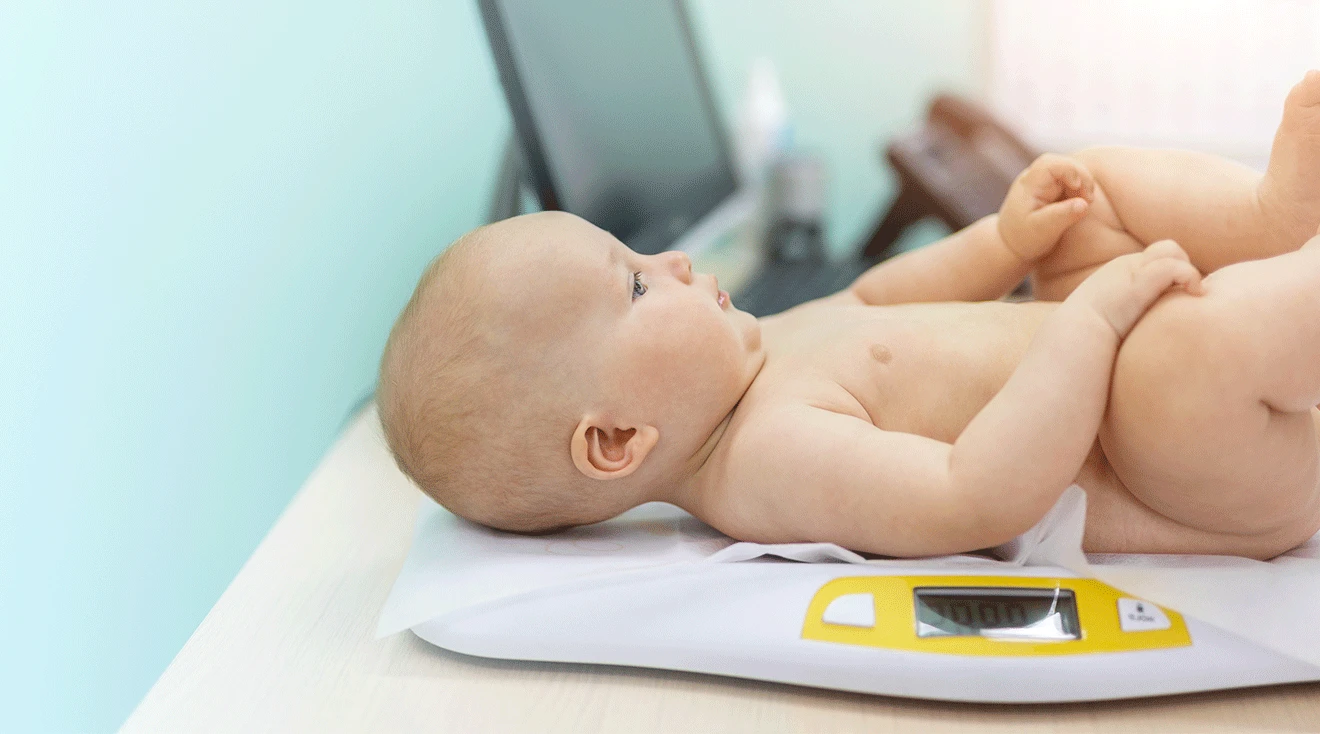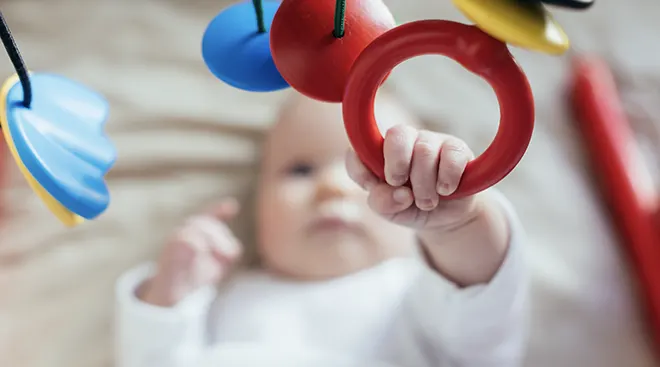Average Baby Weight in the First Year
One of the best parts of visiting baby’s pediatrician for wellness visits is finding out how your little one is progressing. Baby growth charts can track how your infant is developing physically, and you’ll learn where they fall in terms of weight and height compared to other babies their age. But what is the average baby weight at birth, and how many pounds will they pack on in that first eventful year of life? Here, experts break down what you need to know.
Many new parents find themselves wondering, what is the average newborn weight? (And wouldn’t it be nice if you could know exactly how much your little one will weigh at birth before their arrival?) This foresight could help you stock up on appropriately sized diapers and even baby clothes. Of course, there’s no magic way to predict baby’s weight to a T. That said, while you won’t be able to get a precise answer before they’re born, your doctor should be able to give you a rough ballpark estimate. What’s more, you can do some educated guessing based on what’s considered the average birth weight. “The average US baby weighs around 7 pounds at birth,” says Katie K. Lockwood, MD, an attending physician at CHOP Primary Care in South Philadelphia. She adds that a birth weight between 5.5 and 8.5 pounds is considered normal.
Average newborn weight for preemies
For babies born prematurely, average newborn weight will vary and may be on the lower end, depending on how long they spent in the womb. “A preterm baby born between 34 to 36 weeks gestational age, may be around 4 to 5 pounds,” says Meleen Chuang, MD, an ob-gyn and medical director of women’s health at the Family Health Centers at NYU Langone. “Babies born before 29 weeks can weigh less than 2 pounds.”
Doctors don’t just jot down baby’s birth weight for fun and memory-making. Rather, a birth weight that’s abnormally high or low can have significant implications for your little one’s health. “In the short term, it may impact temperature regulation, feeding, blood sugar levels, calcium levels and breathing,” Lockwood says. “In the long term, it may contribute to conditions like diabetes and heart disease.”
Baby’s birth weight is also a jumping-off point for your child’s pediatrician to track their growth and development, notes Gary Reschak, MD, a pediatrician at Northwestern Medicine Woodstock Hospital. “Babies who don’t grow and gain weight appropriately after birth can have poorer developmental outcomes,” he adds.
Newborn weight, height and size vary from baby to baby, and there are a lot of factors that affect baby’s weight at birth, including:
- Genetics. The apple doesn’t fall far from the tree. “Parents that are bigger tend to have big babies, and smaller parents tend to have small babies,” Reschak says.
- Environment and conditions during pregnancy. Baby’s size is “significantly affected” by the environment in your womb, Reschak says. For example, mothers with elevated blood sugars or gestational diabetes may have bigger babies, as they’re exposed to higher levels of sugar in-utero, which stimulates growth.
- Blood flow during pregnancy. “Prenatally, if there is compromise to the baby’s blood supply—whether it is a too-narrow umbilical cord or an issue with the placenta—baby can be born on the small side,” Reschak says.
- Gestational age. Babies that are born before their due date tend to be smaller than those born at or after their due date, Reschak says.
- Multiples. Babies who are part of what’s known as multiple gestation pregnancies (i.e., twins, triplets or more) typically have lower birth weights, Lockwood says.
Baby’s birth weight is a memorable measurement, but it’s normal for newborns to shed some ounces and pounds in the immediate days following their big debut. “A baby may lose up to 10 percent of their birth weight in the days or week after birth,” Lockwood says. By the time they’re 2 weeks old, though, they should have their first growth spurt and be back up to their birth weight.
Beyond that point, your little one should start to pack on the pounds rather consistently, at least for a while. “Babies grow rapidly after birth, and the rate will decrease over time,” Reschak says. He adds that in the first three months of life, infants will average about half to one ounce of weight gain per day. The growth rate will then decrease to about 0.67 ounces of weight gain daily. At the six-month mark, the rate drops to about 0.33 ounces a day. “As a general rule, infants should be at double their birth weight at 4 months and triple their birth weight by 12 months,” he says.
Below, a breakdown of average weight for an infant by age.
Baby’s doctor will often tell you what percentile your little one is in for weight (along with height and length), and they may show you where baby lands on growth charts. “Percentiles help pediatricians track an infant’s growth compared to other infants of the same sex and age around the world,” Lockwood explains. “We worry if a baby is off the chart, below the 5th percentile or above the 95th percentile—or if they’ve crossed over percentiles on the chart.” Typically, a baby should follow along their percentile curve; when they deviate from that pattern, it’s noteworthy. (Learn more about baby percentiles here.)
Your doctor should be keeping tabs on baby’s weight at every wellness appointment. But if baby isn’t feeding well, Lockwood recommends talking to your pediatrician to make sure their growth is on target for their age.
If baby isn’t gaining enough weight, your doctor will want to make sure they’re getting enough calories. “Your pediatrician will take a close look at baby’s diet with you to ensure it’s meeting their growth needs,” Lockwood says. “If they’re eating well and still not gaining weight well, further evaluation will be done to ensure there aren’t other metabolic demands or illnesses contributing to poor weight gain, such as heart, thyroid and other conditions.”
There isn’t necessarily a problem if baby is gaining more weight than expected. “If they have a healthy diet and they’re developing symmetrically and normally, your pediatrician may not do anything about weight gain during infancy,” says Lockwood. That said, if baby is growing in some body parts or dimensions faster than others—or if they’re eating unhealthy foods—your pediatrician will likely evaluate further.
Ultimately, if you have concerns about baby’s weight, bring them up to your pediatrician. They should be able to work with you to find answers.
Frequently Asked Questions
When do babies double their birth weight?
Babies usually double their birth weight around 4 months on average, Reschak says, and triple their birth weight by one year.
Is rapid weight gain in babies normal?
As long as baby’s eating well, getting adequate nutrition and developing symmetrically, rapid weight gain in babies isn’t a problem, Lockwood says. But you do want to pay attention to areas of baby’s body that may be growing more quickly than others. You also want to make sure you’re following baby’s hunger cues rather than overfeeding them.
What other measurements are important for newborns?
As noted, baby’s provider will pay special attention to their height, weight and length for their growth chart. They’ll also chart baby’s head circumference, which helps them “assess brain growth and proper development.”
What birth weight is considered big for babies?
According to Chuang, a weight over 8 pounds 13 ounces could be considered a higher than average infant weight at birth.
What birth length is considered tall for babies?
Most babies range from 18.5 to 21.5 inches at birth, Chuang notes, so a birth length around 22 inches and above would be considered tall for newborns.
Can you predict the size of your baby?
As noted, there are several prenatal factors that influence baby’s birth weight, including genetics, medical conditions, nutrition, illnesses (such as anemia), placental issues and more. Around 30 weeks of pregnancy, you may have a growth scan to assess how big baby is in grams. Providers usually double this number to get a rough estimate of what baby’s birth weight will be, Chuang explains. Keep in mind that “boys tend to be larger than girls, and [babies from] subsequent pregnancies tend to be slightly larger too,” she adds.
Baby will grow and get bigger and change a lot in that first year of life. Soak it all in and reach out to your pediatrician with any questions or concerns. In the meantime, start working on your arm strength—you’re going to be doing some heavy lifting soon!
Please note: The Bump and the materials and information it contains are not intended to, and do not constitute, medical or other health advice or diagnosis and should not be used as such. You should always consult with a qualified physician or health professional about your specific circumstances.
Plus, more from The Bump:
Meleen Chuang, MD, is an ob-gyn and medical director of women’s health at the Family Health Centers at NYU Langone, as well as the chief of obstetrics and gynecology at NYU Langone Hospital in Brooklyn, NY. She earned her medical degree from SUNY Stony Brook.
Katie Lockwood, MD, MEd, is an attending physician at CHOP Primary Care in South Philadelphia and an associate professor of pediatrics at the Perelman School of Medicine at the University of Pennsylvania. She received her medical degree from Jefferson Medical College in Philadelphia.
Gary Reschak, MD, is a pediatrician at Northwestern Medicine Woodstock Hospital. He received his medical degree from St. George’s University School of Medicine.
Centers for Disease Control and Prevention, WHO Growth Standards Are Recommended for Use in the U.S. for Infants and Children 0 to 2 Years of Age, September 2010
Centers for Disease Control and Prevention, Clinical Growth Charts, June 2017
Learn how we ensure the accuracy of our content through our editorial and medical review process.
Navigate forward to interact with the calendar and select a date. Press the question mark key to get the keyboard shortcuts for changing dates.






















































